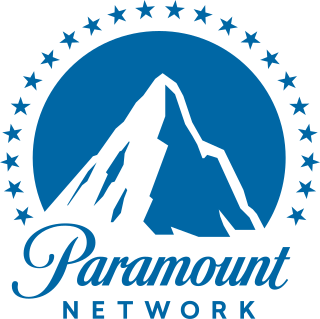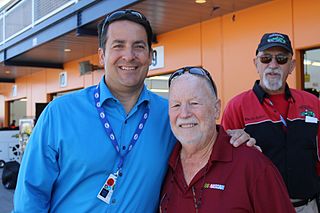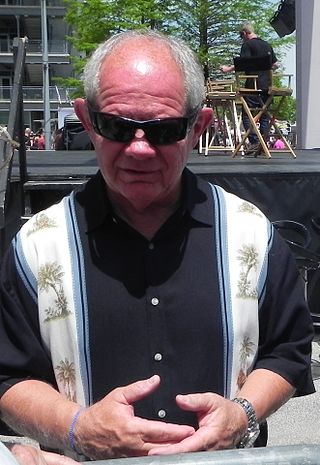
Paramount Network is an American basic cable television channel owned by the MTV Entertainment Group unit of Paramount Media Networks, a division of Paramount Global. The network's headquarters are located at the Paramount Pictures studio lot in Los Angeles.
The Nashville Network, usually referred to as TNN, was an American country music-oriented cable television network. Programming included music videos, taped concerts, movies, game shows, syndicated programs, and numerous talk shows. On September 25, 2000, after an attempt to attract younger viewers failed, TNN's country music format was changed and the network was renamed The National Network, eventually becoming Spike TV in 2003 and Paramount Network in 2018.
Speed was an American sports-oriented cable and satellite television network that was owned by the Fox Sports Media Group division of 21st Century Fox. The network was dedicated to motorsports programming, including auto racing, as well as automotive-focused programs.
Rick Benjamin is a motorsports journalist. He was Speed Channel's voice of the USAR Hooters Pro Cup Series, and was the voice of Champ Car racing for HDNet from 2004 until the end of the final season of Champ Car in 2007.

Ralph Sheheen is an American sports announcer. He is one of the lead broadcasters of NASCAR Xfinity Series on NBCSN, and was the lead commentator of Feld Entertainment's AMA Supercross Championship from 2006 until 2020. He also is the co-owner of the Speed Sport franchise through his stake in Turn 3 Media, LLC, which publishes the aforementioned magazine, the Web site, and both radio and television shows.

Fox Sports, also referred to as Fox Sports Media Group and stylized in all caps as FOX Sports, is the sports programming division of the Fox Corporation that is responsible for sports broadcasts carried by the Fox broadcast network, Fox Sports 1 (FS1), Fox Sports 2 (FS2), and the Fox Sports Radio network.

The American Speed Association (ASA) is a sanctioning body of motorsports in the United States formed in 1968. The Association was based in Pendleton, Indiana, and later in Daytona Beach, Florida. The ASA sanctioned asphalt and dirt tracks in their ASA Member Track program along with racing series in the United States and Canada.

Paul Page is an American motorsports broadcaster who is best known for serving as the play-by-play commentator for the Indianapolis 500 for a total of 27 years across radio and television. Page was the radio Voice of the 500 on the Indianapolis Motor Speedway Radio Network from 1977 to 1987, and again from 2014 to 2015. He served the same role on television in 1988–1998 & 2002–2004.
Motor Racing Network (MRN) is a U.S. radio network that syndicates broadcasts of auto racing events, particularly NASCAR. MRN was founded in 1970 by NASCAR founder Bill France, Sr. and broadcaster Ken Squier, and is a wholly owned subsidiary of NASCAR. Its first broadcast was the 1970 Daytona 500.

Martin Reid "Marty" Klingeman, known professionally as Marty Reid, is an American television sportscaster who worked for ESPN from 1982 to 2013, covering motorsports for the network. Reid served as the network's lead IndyCar Series and Indianapolis 500 announcer from 2006 until that year, and did lap-by-lap for ESPN's NASCAR Sprint Cup Series telecasts in 2010.
Kenley Dean Squier is an American sportscaster and motorsports editor from Waterbury, Vermont. From 1979 to 1997, he served as the lap-by-lap commentator for NASCAR on CBS, and was also a lap-by-lap commentator for TBS from 1983-1999. Squier was the first announcer to give lap-by-lap commentary for the Daytona 500 in 1979. He coined the term "The Great American Race" for the Daytona 500 and helped introduce the Australian developed in-car camera for the 1982 running of the event. He lives in Stowe, Vermont.
NASCAR on CBS was the branding formerly used for broadcasts of NASCAR series races produced by CBS Sports, the sports division of the CBS television network in the United States from 1960 to 2000.
American Sports Cavalcade was an American motorsports television show produced by Diamond P Sports in Hollywood, California that aired on The Nashville Network (TNN) from 1983 to 1995. American Sports Cavalcade was a winner of the cable television ACE Award for their motorsports coverage.

Michael Ashley Hogewood was an American sportscaster. He was a play-by-play announcer, studio host, and sideline reporter.
In the United States, sports are televised on various broadcast networks, national and specialty sports cable channels, and regional sports networks. U.S. sports rights are estimated to be worth a total of $22.42 billion in 2019, about 44 percent of the total worldwide sports media market. U.S. networks are willing to pay a significant amount of money for television sports contracts because it attracts large amounts of viewership; live sport broadcasts accounted for 44 of the 50 list of most watched television broadcasts in the United States in 2016.
NASCAR on TNN was the name of a television program that broadcast NASCAR races on The Nashville Network.

ESPN SpeedWorld is a former television series broadcast on ESPN from 1979 to 2006. The program that was based primarily based around NASCAR, CART, IMSA, Formula One, NHRA, and IHRA. The theme music is based on the piano interlude from "18th Avenue " by Cat Stevens.

The NHRA Camping World Drag Racing Series is a drag racing series organized by the National Hot Rod Association (NHRA). It is the top competition series of the NHRA, comprising competition in four classes, including Top Fuel Dragster, Funny Car, Pro Stock, and Pro Stock Motorcycle.
As time passed, more Winston Cup races ended up on TV. ESPN broadcast its first race in 1981, from North Carolina Motor Speedway, and TNN followed in 1991. All Cup races were nationally televised by 1985; networks struck individual deals with track owners, and multiple channels carried racing action. Many races were shown taped and edited on Wide World of Sports and syndication services like Mizlou and SETN, but almost all races were live by 1989. By 2000, the last year of this arrangement, six networks televised at least one Cup series race: CBS, ABC, ESPN, TNN, TBS, and NBC.
Until 2001, race tracks struck individual agreements with networks to broadcast races, but NASCAR wanted to capitalize on the growing popularity of the sport and announced in 1999 that television contracts would now be centralized; that is, instead of making agreements with individual tracks, networks would now negotiate directly with NASCAR for the rights to air a package of races.









